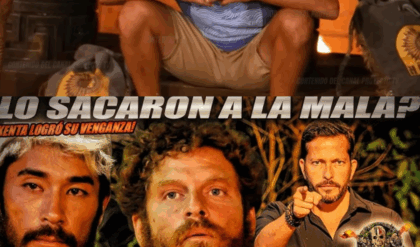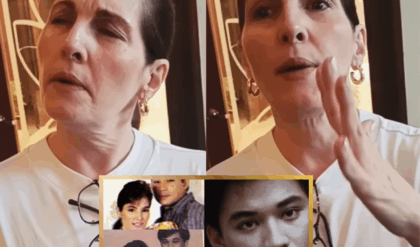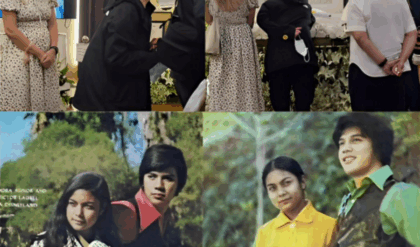Lennox Lewis was a promising 18-year-old amateur and Mike Tyson a precocious 17-year-old, when Lewis and his amateur coach Arnie Boehm were invited by Cus D’Amato to join he, Tyson and Kevin Rooney for eight days of training and sparring in the Catskills in upstate New York.
“I learned a lot in the sparring, and picked up some interesting ideas from Cus D’Amato,” Lewis said years before he and Tyson’s professional rivalry became heated, and decades before he and Tyson would be pall-bearers at the funeral of Muhammad Ali.

3
Before the fight even began, security guards formed a barrier to keep Tyson and Lewis apart owing to the pre-fight press conference brawl that erupted between themCredit: Getty

3
When they finally met in the ring, Lewis stopped Tyson in the eighth roundCredit: Getty – Contributor
“The first impression I got was that he was a hard case. He was short, muscular and rough-looking. But what surprised me most of all was his voice. It was a very light, high voice, and when he spoke it was almost like a squeak.
“We made an odd sort of pair, because at the time I was skinny and lanky and he was stocky and quite small. But we got on fine.”
“They were running together, training and joking, like two old friends,” said Boehm. “On day three Cus said, ‘Do you think we could spar?’ Lennox had a bit of a cold but he said he wanted to go ahead.
“He wasn’t accustomed to meeting a guy that ferocious. So that first day it was all Mike. The second day things started to even up. Lennox was evading his charges and getting in good punches of his own. The third day? Outright war. Lennox was giving as good as he got, and a bit more. Tyson got so frustrated at one point he said, ‘Come on, come on, chicken – hit me’, and bang – Lennox nailed him.
“Then Cus stopped it and said, ‘That’s enough of that. I don’t want any more of that showboating’. That’s the kind of fatherly control Cus had over Mike. But the sparring was fine after that.
“They boxed. They sparred. They tried to kick the hell out of each other. At the end of the week of non-stop battle Lennox had learned so much. And if you had to score how it went you’d be hard put to name the winner. I tell you, it was very close.”
It was his pursuit of success at the 1984 Olympics in Los Angeles that contributed to Lewis – word of his talent having spread beyond Canada – and Boehm accepting their invitation.
“That time was like an intensive study course on boxing,” Lewis later said of the eight days spent running with, training alongside and sparring the prodigy from the Brownsville ghetto. “It was ordained that Tyson and I would fight each other as professionals. Cus D’Amato kept saying, ‘You two will meet again in the ring one day’. Over the years I came round to thinking [we] would.”
The younger of the two by 10 months, Tyson regardless turned professional over four years before Lewis when in March 1985 he stopped Hector Merced inside a round. In under 18 months he became the youngest heavyweight world champion in history by defeating Trevor Berbick in two aged 20, before Lewis – having lost to Tyrell Biggs in LA – established himself as a heavyweight of potentially the highest calibre at Seoul ‘88 by beating Riddick Bowe to win Olympic gold.
When in 1989 Lewis made his professional debut by stopping Al Malcolm in two rounds at Kensington’s Royal Albert Hall, Tyson was regarded as not only the world’s leading heavyweight but one of the finest of all time. Even if the prospect of them one day finally fighting seemed likely, there were few who would have predicted it would take 13 further years.
Lewis gained revenge over Biggs as a professional and in 1992 was declared WBC heavyweight world champion after a two-round victory over Donovan ‘Razor’ Ruddock. Ruddock had lasted the distance with Tyson 14 months earlier in Tyson’s final fight before he was sentenced to six years in prison when convicted of rape.
Released after three and, perversely, even more marketable as a consequence, Tyson resumed competing at the top of their division at a time when Lewis was rebuilding his career under Emanuel Steward following his shock defeat by Oliver McCall. Lewis reclaimed his status and his title with victory over McCall in February 1997; five months later Tyson was banned from boxing for 15 months by the Nevada State Athletic Commission (NSAC) after biting Evander Holyfield’s ear in their rematch, ensuring that they would continue on separate paths.
By in turn defeating Holyfield in 1999 to also win the WBA and IBF titles, Lewis, beyond all doubt, had established himself as the world’s finest heavyweight. In defeating Holyfield he had recorded victory over a fighter who had previously stopped Tyson, and yet Tyson, his reputation surpassing the reality of the decline that had started almost a decade earlier, was the opponent he was repeatedly told he had to fight.
Tyson, aware of his decline if not willing to publicly acknowledge it, recognised that a date with Lewis represented his most lucrative option. ‘I want to eat his children,’ he said after stopping Lou Savarese in under a round in June 2000, heightening the tension that already existed between them, even if the first of Lewis’ four children wouldn’t be born for another four years.
Lewis losing to Hasim Rahman and prioritising revenge then caused a further delay to the negotiations that were already expected to prove difficult. Lewis was contracted to HBO, and Tyson committed to Showtime, but terms were eventually agreed for April 6, 2002 at Las Vegas’ MGM Grand.
The champion is said to have anticipated being confronted by his rival at the first press conference to discuss their upcoming date, and he was proved right that January in New York when Tyson marched towards him at their first face off and Lewis responded by throwing punches at him while Tyson bit him on the leg.
When the NSAC refused to give Tyson – forced to pay Lewis $335,000 as a consequence – a license to fight, the fight the world was demanding was instead reorganised for June 8, 2002 at The Pyramid in Memphis.
In the ring that night Lewis was widely considered to have deliberately prolonged punishing his rival. He then proceeded to end Tyson’s lengthy run as an elite heavyweight and their rivalry by stopping him in the eighth round.

3
Years later, the rivalry is long deadCredit: Getty





